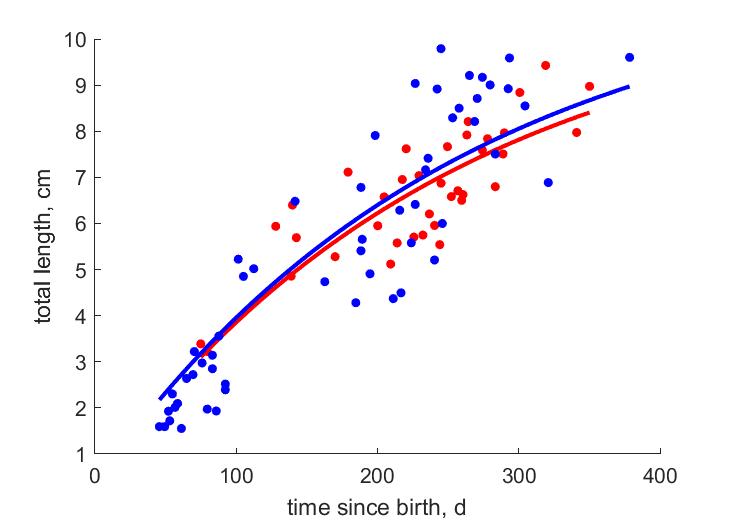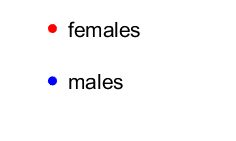Predictions & Data for this entry
| Model: std | climate: MA | migrate: Mo | phylum: |
| COMPLETE = 2.5 | ecozone: MI, MPW | food: biCi, biPz | class: |
| MRE = 0.102 | habitat: biMr | gender: D | order: |
| SMSE = 0.019 | embryo: Mc | reprod: O | family: |
Zero-variate data
| Data | Observed | Predicted | (RE) | Unit | Description | Reference |
|---|---|---|---|---|---|---|
| ab | 4.5 | 4.288 | (0.04703) | d | age at birth | guess |
| am | 380 | 380 | (4.632e-06) | d | life span | HernMund2005 |
| Lp | 4.87 | 5.246 | (0.07715) | cm | total length at puberty | HernMund2005a |
| Lim | 10 | 11.55 | (0.1546) | cm | ultimate total length for males | fishbase |
| Wwb | 0.0002771 | 0.0002815 | (0.01601) | g | wet weight at birth | guess |
| Wwp | 1.09 | 1.063 | (0.02436) | g | wet weight at puberty | fishbase |
| Wwi | 10 | 10.08 | (0.00753) | g | ultimate wet weight | fishbase |
| Ri | 38.36 | 38.34 | (0.0005306) | #/d | maximum reprod rate | guess |
Uni- and bivariate data
| Data | Figure | Independent variable | Dependent variable | (RE) | Reference |
|---|---|---|---|---|---|
| tL_f |   | time since birth | total length | (0.1007) | HernMund2005 |
| tL_m |   | time since birth | total length | (0.181) | HernMund2005 |
Pseudo-data at Tref = 20°C
| Data | Generalised animal | Amblygobius bynoensis | Unit | Description |
|---|---|---|---|---|
| v | 0.02 | 0.02081 | cm/d | energy conductance |
| p_M | 18 | 55.38 | J/d.cm^3 | vol-spec som maint |
| k_J | 0.002 | 0.002 | 1/d | maturity maint rate coefficient |
| k | 0.3 | 0.1884 | - | maintenance ratio |
| kap | 0.8 | 0.9 | - | allocation fraction to soma |
| kap_G | 0.8 | 0.8019 | - | growth efficiency |
| kap_R | 0.95 | 0.95 | - | reproduction efficiency |
Discussion
- males are supposed to differ from females by {p_Am} only
Facts
- length-weight: weight in g = 0.00832*(TL in cm)^3.08 (Ref: fishbase)
Bibliography